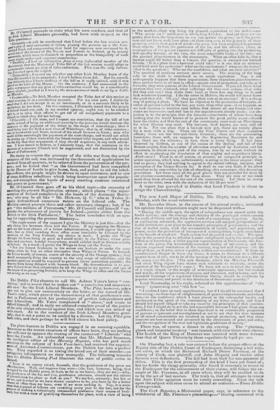The new Lord Mayor of Dublin, Mr. Hoytc, was installed,
on Monday, with the usual solemnities.
Mr. Recorder Shaw, in the course of his annual oratioa, intimated his opinion that corporations might now be dispensed with-
" During the middle ages, the spirit of independence was nursed under the feudal system; and the courage sod chivalry of the privileged orders rescued the seeds of liberty and law from the hands of a sanguioary •Itpotisin. Again, as civilization advanced, the oppressive services and unequal julisprudence of feudal institutions gave place to the sounder principles of government, and the rise of walled cities, with the accumulation of wealth, and pope' &on, and power, under the protection of incorporated municipalities, largely contributed to the benefit of itiank;nd. Each sy stem bad its period and i.s use. The qua- tion iu the present day is, whether a more enlightened spirit, the more general diffusion of knowledge, a fuller 'Joinder I epresentation in Paz lament, the fice- diem of the prem, the wonder ally-increased facility of interwar-e, and the various improved institutions of the country, may not well divests,: .,ith the aid of those, us it were, minor republics within our constitution/ It there be constitutional danger in those our titles, it seems to threaten in a different quarter front of old ; not to be of the tyranny of the few over the teems., but of the many over the few. [The new doctrine, which the Moretioy Chronicle and other Whig organs have shown such solicitude to inculcate, under the sanction of De Tocqueville's name.] We have not r,..v to (head the cruelty of a single despot, or the weight of aristocratic oppression ; but lest wisdom and worth, all the acquisitions of science, and literature, aod industry, and the manifold blessings of a regulated Christian liberty, should be overborne by popular ambition, and perish in the desolation of democratic anarchy."
Lord Normariby, in his reply, referred to the apprehension of " the many" tyrannizing over "the few "- " I confess I have no such apprehension ; but if I should be convinced that I was wrong—in these days of enlightenneeet, of general improvement, sad educa- tion—in the coufideuce which I have placed in the unbouuded loyalty and atachment to the spirit of the constitution of my fellow subjects, and that I should feel myself obliged to take my stand by the principles of that constitu- tion, I feel I might do so out the less successfully because I had given them any confidence; in the belief that in these days there is no considerable proportion of persons so ignorant and unenlightened as not to see that the true interests of all mixed communities are involved in mutual protection, and that those interests are beet secured and preserved by the observance of peace and order, and the recognition of the true and legitimate gradations of society."
There was, of course, a dinner in the evening. The " glorious, piouw, and immortal memory " was toasted, with nine times nine cheers. The health of the King of Hanover was received with more fervour than that of Queen Victoria by these superlatively loyal pet. one.


























 Previous page
Previous page